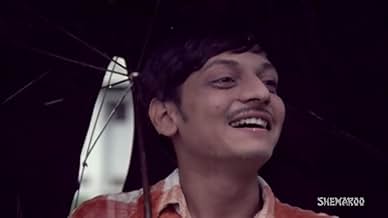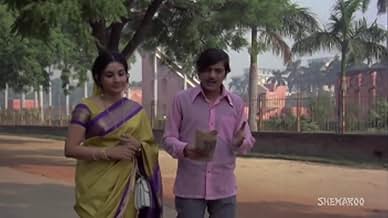Aggiungi una trama nella tua linguaA Delhi-based woman in a steady relationship with her boyfriend is forced to come to terms with her true feelings when a job interview in Mumbai brings an old flame back in her life.A Delhi-based woman in a steady relationship with her boyfriend is forced to come to terms with her true feelings when a job interview in Mumbai brings an old flame back in her life.A Delhi-based woman in a steady relationship with her boyfriend is forced to come to terms with her true feelings when a job interview in Mumbai brings an old flame back in her life.
- Premi
- 3 vittorie
Trama
Lo sapevi?
- QuizRajnigandha won the Filmfare award for Best film in 1975. It was the debut film for Amol palekar in Hindi film Industry.
- ConnessioniFeatured in Kahaani 2 (2016)
- Colonne sonoreRajnigandha Phool tumhare
Playback by Lata Mangeshkar (as Lata)
Recensione in evidenza
A beautiful young MA student from Delhi, who's been in a stable relationship with her boyfriend Sanjay, travels to Bombay to apply for a new job as a lecturer at a local college. She stays at a friend's residence and meets her old flame, Navin, an idealistic young man who had split with her several years back at a moment of fury. The presence of Navin in her life rekindles old feelings and she grows increasingly apprehensive about her relationship with Sanjay, often comparing the two men and unable to decide what she actually wants to do. This is the basic story of Basu Chatterjee's unusual psychological drama Rajnigandha. And it is indeed unusual and rare for the time and on so many levels.
A thinking man's picture, Rajnigandha is unusual in its complete focus on the leading lady's perspective, which is never judged or criticised, and it is her inner turmoil which drives the proceedings. Chatterjee, in his own, admirable style creates a film which is subtly realistic and beautiful both in how well it's shot but more in its engaging simplicity. The narrative style is somewhat similar to what we have today, no song-and-dance sequences, just two songs in the entire film, both playing in the background while the story is carried forward. Composed by Salil Chowdhury, the two musical gems, "Kai Baar Yuheen" and "Rajnigandha", are wonderfully performed by Mukesh and Lata Mangeshkar, respectively.
Portraying the lives of India's urban middle-class, Chatterjee manages to capture the aura of this milieu, its characters, comprising mostly worldly, intellectual individuals, and particularly the main protagonist's experience. The story flows incredibly well, mostly through conversational scenes, but it also gives its viewers a nice glimpse into the beauty of the cities it's set in. The cinematic experience is enhanced by both the cinematography and the setting. Bombay is photographed beautifully - its restaurants, beaches, and flats, are all wonderfully presented to contribute. The dialogue is very simple and casual. The film is altogehter a winning example of what they used to call middle-of-the-road cinema.
Vidya Sinha is well-cast in terms of both her appearance and graceful demeanor, but even though she is very good and effective within the parameters of the film, this difficult character could have been played with more conviction by a more competent actress. This role really requires a more mature actress who could register the complexity and the many shades of this conflicted woman - thinking of the great ladies of those years, such as Jaya Bhaduri, Shabana Azmi, and the likes, actresses who already showed how much they can convey by doing very little. This is not to say Singh isn't good - she is, but her lack of experience shows, even though she keeps growing on you as the story goes by.
The two men are played brilliantly by Amol Palekar and Dinesh Thakur. Palekar, in his debut performance, is nicely outgoing as Sanjay, and Thakur, quite his polar opposite - reserved and controlled - gives an excellent, grounded act as Navin. Although instantly engaging, Rajnigandha picks up toward its second half where it turns into a meaningful psychological drama. It just keeps building up and you just can't predict right till the very end how the story is going to conclude, and that's where the film scores. Despite getting some positive notice back when it released, Rajnigandha remains quite an underrated gem, and sadly so. It is a beautiful film, and I wish today's movie buffs would rediscover it, just like I did.
A thinking man's picture, Rajnigandha is unusual in its complete focus on the leading lady's perspective, which is never judged or criticised, and it is her inner turmoil which drives the proceedings. Chatterjee, in his own, admirable style creates a film which is subtly realistic and beautiful both in how well it's shot but more in its engaging simplicity. The narrative style is somewhat similar to what we have today, no song-and-dance sequences, just two songs in the entire film, both playing in the background while the story is carried forward. Composed by Salil Chowdhury, the two musical gems, "Kai Baar Yuheen" and "Rajnigandha", are wonderfully performed by Mukesh and Lata Mangeshkar, respectively.
Portraying the lives of India's urban middle-class, Chatterjee manages to capture the aura of this milieu, its characters, comprising mostly worldly, intellectual individuals, and particularly the main protagonist's experience. The story flows incredibly well, mostly through conversational scenes, but it also gives its viewers a nice glimpse into the beauty of the cities it's set in. The cinematic experience is enhanced by both the cinematography and the setting. Bombay is photographed beautifully - its restaurants, beaches, and flats, are all wonderfully presented to contribute. The dialogue is very simple and casual. The film is altogehter a winning example of what they used to call middle-of-the-road cinema.
Vidya Sinha is well-cast in terms of both her appearance and graceful demeanor, but even though she is very good and effective within the parameters of the film, this difficult character could have been played with more conviction by a more competent actress. This role really requires a more mature actress who could register the complexity and the many shades of this conflicted woman - thinking of the great ladies of those years, such as Jaya Bhaduri, Shabana Azmi, and the likes, actresses who already showed how much they can convey by doing very little. This is not to say Singh isn't good - she is, but her lack of experience shows, even though she keeps growing on you as the story goes by.
The two men are played brilliantly by Amol Palekar and Dinesh Thakur. Palekar, in his debut performance, is nicely outgoing as Sanjay, and Thakur, quite his polar opposite - reserved and controlled - gives an excellent, grounded act as Navin. Although instantly engaging, Rajnigandha picks up toward its second half where it turns into a meaningful psychological drama. It just keeps building up and you just can't predict right till the very end how the story is going to conclude, and that's where the film scores. Despite getting some positive notice back when it released, Rajnigandha remains quite an underrated gem, and sadly so. It is a beautiful film, and I wish today's movie buffs would rediscover it, just like I did.
- Peter_Young
- 5 ott 2022
- Permalink
I più visti
Accedi per valutare e creare un elenco di titoli salvati per ottenere consigli personalizzati
- How long is Rajnigandha?Powered by Alexa
Dettagli
- Paese di origine
- Lingua
- Celebre anche come
- Раджнигандха
- Vedi altri crediti dell’azienda su IMDbPro
- Tempo di esecuzione1 ora 50 minuti
- Mix di suoni
Contribuisci a questa pagina
Suggerisci una modifica o aggiungi i contenuti mancanti

Divario superiore
By what name was Rajnigandha (1974) officially released in Canada in English?
Rispondi



















